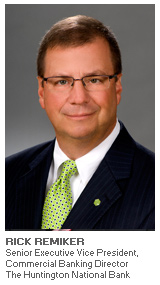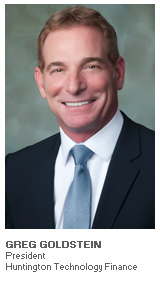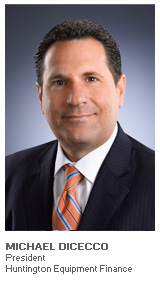In late February of this year, the equipment finance industry learned of Huntington Bank’s agreement to acquire Macquarie Equipment Finance. The deal, which is comprised of approximately $900 million in assets and $630 million in liabilities, was finalized on March 31, 2015. In the following triple interview, Equipment Finance Advisor takes the occasion to speak with Huntington’s Rick Remiker and Mike DiCecco along with Greg Goldstein from the former U.S. operations of Macquarie Equipment Finance, to better understand the impetus and rationale for the acquisition.
The three executives expound upon how the combined operations will fuel Huntington with expanded competencies and opportunities for expansion.
Equipment Finance Advisor: Rick, please explain what made the acquisition of Macquarie Equipment Finance the right acquisition at the right time for The Huntington Bank? What was the strategic rationale behind this acquisition?

Rick Remiker: First and foremost, Macquarie Equipment Finance brings a high quality management team – a team that had worked together for several decades under several different ownership structures. This is one of the truly compelling aspects of this acquisition … a cohesive team that views the equipment finance business similarly to the ways we at Huntington do.
Secondly, Macquarie EF brings a high quality customer base. Many are long-time customers – some as long as 20 years – that fit in very well within the bank regulatory environment. Often times these days, you see acquisitions of specialty finance businesses that are predominantly non-bank commercial finance portfolios. In the new regulatory environment, this poses difficulties. This acquisition brings a high quality credit portfolio that has deep roots with the Macquarie team that also has some stickiness as we combine.
And thirdly from Huntington’s perspective, we had made an acquisition of a Columbus-based technology leasing company called LeaseNet back in 2002. We never had the scale that the Macquarie EF has. Greg Goldstein and the Macquarie team have done a great job in managing their technology portfolio and it gave us great comfort when we saw that their data and client experiences were almost identical to ours. Their technology business is very closely aligned with our historical experience and this gives us the scale of a national platform in technology as well as in healthcare leasing.
Additionally, the Macquarie team brings a small-ticket leasing capability which Huntington didn’t have and we intend to leverage this within our small business sector. Finally, the team is headquartered in Bloomfield Hills, Michigan … squarely in the Huntington footprint and that augmented our interest in making this acquisition.
Equipment Finance Advisor: We note that the press releases made it a point to mention Huntington’s recent acquisitions in Michigan. Can you explain Huntington’s active pursuit of investment opportunities in Michigan in great detail?
Remiker: Let me first say that we would have been interested in the Macquarie business regardless of where it had been located … even if it had been outside of our footprint. But the play for Michigan – and we can set this acquisition to the side – is something Huntington began five or six years ago at the time others were exiting. Other banks either pulled back or pulled out of Michigan entirely during the financial crisis and Huntington took a contrarian approach and began to play aggressively there. It was a market that was depressed but we felt it was a market that had long-term positive demographic and business impacts for Huntington. In short, it blended well with our Midwest economy. Our CEO Steve Steinour has dubbed our markets as the Recovery Belt as opposed to the Rust Belt. We think that Michigan, and in particular Detroit and East Michigan, exemplify this Recovery Belt. It’s an economy on the rebound.
If you think about it, Pittsburgh has PNC; Cleveland has Key Bank and Cincinnati has Fifth Third. There is no dominant hometown bank headquartered in Detroit anymore. We have the opportunity to step up and be a leader there. We are investing in this and other Michigan businesses to grow our Michigan market. The existing management team will continue to run the new Huntington Technology Finance, which will be branded separately and they will remain in Michigan.
Equipment Finance Advisor: Greg, from your perspective, please describe the former Macquarie EF’s business origination platform and what it brings to the Huntington organization and vice versa?

Gregory Goldstein: We actually bring two platforms … one which we call the Enterprise platform and the other which is our small-ticket platform. Our Enterprise platform is our large customized platform which we have been doing for well over 25 years. For the most part, this services the technology needs of large corporate Fortune 1000 customers. We approach these customers by asking, “What are your financing needs….various structures, terms and financial conditions?” This has proved to be an effective way to compete with large captives and large banks because it has been our experience that as these competitors get larger, they become more rigid. We pride ourselves on our flexibility and our creativity. The success we’ve experience over the last 25 years bears that out. Our small-ticket platform has only been in existence in the last few years but we’ve seen significant growth there. The small ticket platform gives us more capabilities and enables us to say yes to any opportunity … regardless of its size or the type of asset being financed.
Equipment Finance Advisor: Please explain why Huntington was such a good fit.
Continued on Page 2...
Goldstein: There are several reasons as to why this is such a good fit. We were part of Macquarie for eight years and prior that that, we were part of CIT, Newcourt and AT&T. With Macquarie, we had some significant constraints. We had a high cost of funds which forced us to fund our business through securitization and third parties. Huntington was a good fit because as a business we wanted to land someplace where we could make a significant contribution, there was cultural alignment, and Huntington Equipment Finance wants to grow this business through a national platform, which we offer. At the same time, Huntington brings “better fuel” that what we had at Macquarie. That fuel is a lower cost of funds, a willingness to fund the business internally and a greater understanding of the U.S. marketplace. All of this will translate into providing more products and services to our customers who are the real beneficiaries here.
Equipment Finance Advisor: Mike, please share your thoughts on the Macquarie acquisition and the new opportunities the two platforms under the Huntington umbrella represent for the future.

Mike DiCecco: Let me first say this: we think the combination of our existing equipment finance businesses with the new capabilities that Macquarie brings represents an extremely compelling value proposition for our clients. Over the last several years, we have built a strong and diversified business here at Huntington. Our equipment finance has focused on penetrating middle-market and large corporate clients within the footprint and we have excelled at that for the last five years. To give you a bit of perspective, we have launched into business verticals such as corporate aviation, rail car finance, municipal finance and lender finance surrounding that core footprint business. At the same time, we have built our capital markets capabilities … so, over the past five years, we’ve built a diversified business and we think that Macquarie adds to that diversification in the areas of technology and healthcare finance. These represent tremendous growth opportunities for us at Huntington. In addition to technology and healthcare, we strongly believe that Macquarie’s small-ticket leasing platform now brings a value proposition to Huntington’s business banking clients, a financial solution which we've been missing for several years.
We are very excited about this. When I consider the depth and capability of these combined leadership teams and broader set of capabilities, I think we are going to be able to play at a much higher level than we have in the past.